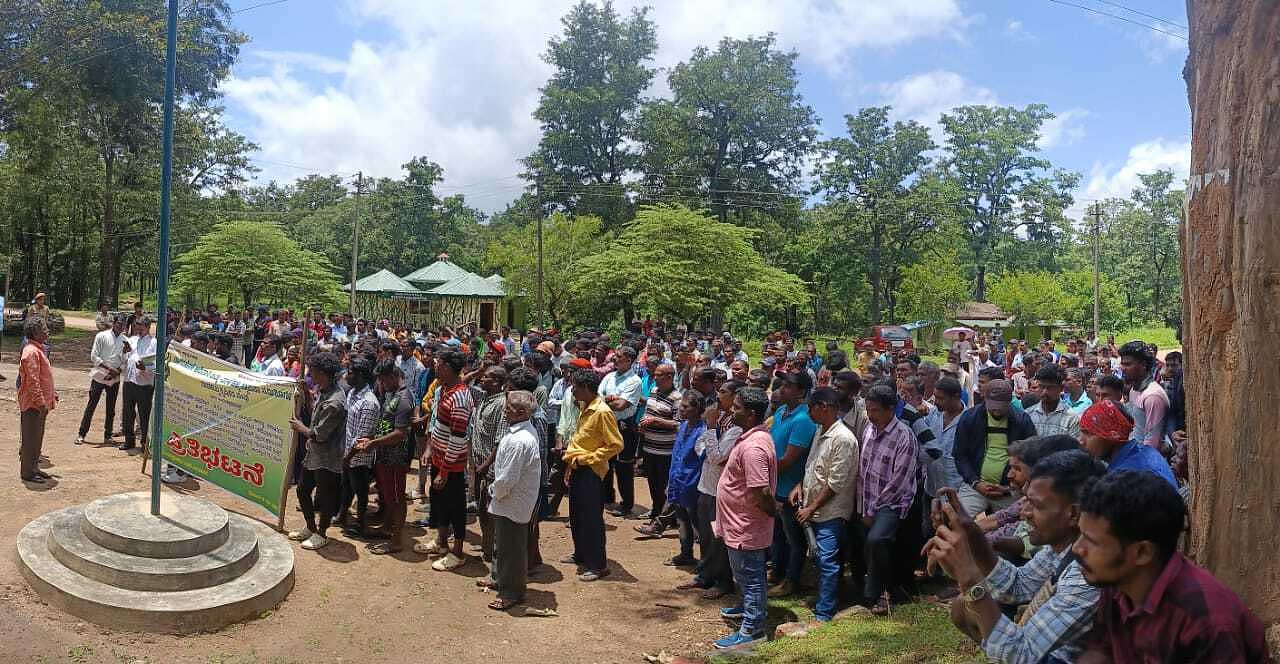Thousands of Adivasi (Indigenous) people across India have rallied against forced evictions in the name of tiger conservation. They held mass protests at several of the country’s most famous tiger reserves.
Tiger reserves: forced evictions
As the Canary previously reported, 2023 marked the 50 year anniversary of Project Tiger. This is a government-funded scheme to establish tiger reserves across the country. It initially covered nine reserves across nine Indian states.
To date, the government has sponsored state authorities to set up 55 of these protected areas across 17 states. State governments have designated these areas to protect tiger populations from significant threats which have caused their numbers to plummet.
Specifically, deforestation, poaching, and human encroachment on habitats have purportedly decimated tiger populations across Asia. In 1900, 100,000 tigers roamed the planet. However, that fell to a global record low of 3,200 in 2010.
But these reserves also represent a legacy of violence and human rights abuses against the Indigenous communities living in them.
According to the World Rainforest Movement, as of 2019, NTCA data showed that state governments have evicted 56,247 families for tiger conservation across India since 1972. These families were from 751 villages across 50 tiger reserves.
Of course, since then, state governments have threatened many more Indigenous communities with eviction. Reports by human rights advocacy and research charity the Housing and Land Rights Network (HLRN) underscore this. The charity produces annual reports on forced evictions in India. According to its latest report, in 2023 and 2022 alone, authorities evicted at least 417 families in two separate tiger reserves.
Hundreds of thousands face eviction for tiger conservation
Throughout 2024, this state-sponsored colonial conservation has only continued apace.
In July, a letter from the director of India’s National Tiger Conservation Authority (NTCA) sparked outrage among Indigenous communities. A Right to Information request revealed that he had written to Chief Wildlife Wardens in 19 states urging them to evict more Adivasis from tiger reserves. Close to 400,000 Adivasis face eviction from tiger reserves across India.
Given this, Indigenous people facing, or already evicted, have mounted a wave of protests. The week commencing 9 September, they gathered at a number of notable tiger reserves. These included Nagarhole, Udanti-Sitanadi, Kaziranga, Rajaji, and Indravati. Many more protests are planned.

Almost 700 Adivasi people from 25 villages protested at the entrance gates of Nagarhole in Karnataka state. It is one of India’s most infamous tiger reserves. There, in 2007, the state government designated the reserve.
However, it imposed this, without seeking consent, on the ancestral land of the Jenu Kuruba. The reserve was also home to other Indigenous communities, such as the Beta Kuruba, Yarava, and Pania tribes.
Leading Adivasi activist JK Thimma said at the protest:
Declaration of tiger reserves on our lands is a violation of the law as our people neither consented to it nor were consulted in the process. Today they have put up signs on our lands declaring them national parks and tiger reserves. NTCA is a trespasser on our lands.
This violation of Indigenous rights must immediately stop and the conservationist cartels (including NGOs like WWF, WCS & WTI) who are involved in doing this must be punished according to the law.
A legacy of ‘deep-seated racism’
The lives of hundreds of thousands of Adivasis in Indian tiger reserves are being destroyed in the name of tiger conservation. The Indian government is illegally evicting them from the land where they have always lived, land which they have always protected.
The big conservation organizations such as WWF and WCS never speak out against the evictions, and claim that “relocations” of tribal people are “voluntary.” But the “relocations” are almost always, in fact, forced evictions.
Survival International’s director Caroline Pearce said:
The Indian authorities seem hellbent on sticking with a totally outdated and discredited colonial model of conservation, one still backed by the likes of WWF and WCS, which views Indigenous peoples as trespassers on their own lands, and brutally evicts them.
There’s a deep-seated racism at work here – the government and conservation organizations view the Adivasis as second-class citizens at best.
These evictions are unlawful according to both national and international law, and don’t work – the forest, the Indigenous people and the tigers can’t survive without one another. Conservation organizations and tour operators are complicit in this scandal – once the people have been cleared out of their ancestral forests, tiger reserve tourism is big business.
Feature and in-text images via Survival International




